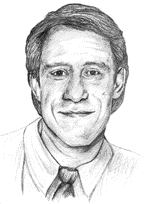 |
I think the nerds are on to us. It's not news that academics have been studying the behavior of investors and finding it less than optimal for wealth maximization, and certainly not news to longtime readers of STOCKS & COMMODITIES. (If you doubt me, check out our September 1998 interview, on page 68!) That's not to say that in the aggregate, investors don't form a pretty good estimate of prices, but detailed studies being taken from brokerage house records confirm suppositions posited in the world of psychology back in the 1960s and 1970s.
It was noted then that individuals have very different ideas about chance, gain, and loss -- different, that is, from the ideas of utility theorists who have always assumed that people acted rationally to get the greatest benefit available to them. It turns out that's not so, especially with regard to money. That's why you'll find folks with savings in the bank at 5% interest and credit cards outstanding at 18% interest.
Later, in the 1980s, financial empiricists took up the question of whether people behaved rationally in their individual investment decisions. Well, rational is too strong a term; in this field, it's whether they acted to gain the greatest utility or to maximize wealth. As the psychologists suspected, they don't. Instead, as traders have known, they buy high and sell low, get in late and get out early. They're usually long, rarely short. They're buyers unless taxes push them into being sellers. The extent of these phenomena -- traders would say it's universal -- is only recently becoming apparent as voluminous trading databases are becoming available to researchers.
For traders, such validation is almost as good as group therapy. Many of our crazy mistakes come from our hard-wired brains and not from our childhood! Solutions are still far away, but the process has begun by defining our proclivities. It's only a matter of time before trading coaches read the behavioral finance studies and translate the information into usable tactics.
Financial empiricists will continue studying individuals, but they should turn their attention to the masses. Given the data now available, they should be able to discern the hypothesis of technical trading: people not only do not act rationally but act to mimic the behavior of others. Instead of pursuing rational approaches consistently, the records will probably show both individuals and institutions following their peers and generating, in the process, the market behaviors that technicians try to define with patterns and indicators.
Right now, that thinking is limited to social psychologists, a scarce breed. However, there are gobs of academic financial empiricists who should be scanning the literature. It won't be news on Wall Street that the mob doesn't behave rationally, but the exact mechanisms, which are well known to the Street's practicing salesmen, could provide some real help and insight to technicians.
Good fortune!